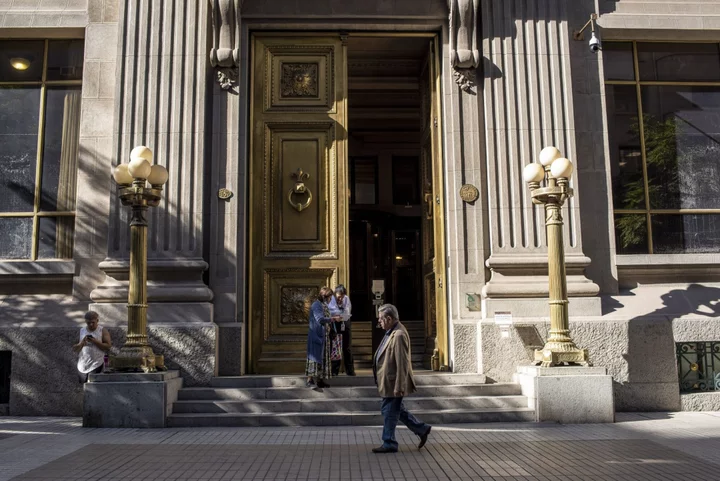Chile’s central bank raised capital requirements on financial institutions, tightening credit conditions amid concern over the risk a global shock could pose to the local economy. Short-term swap rates and bank stocks declined.
A worsening of the international financial outlook would lead to high volatility, lower liquidity and capital flight from emerging markets, policymakers wrote in their financial stability report on Wednesday.
“The board has activated the counter-cyclical capital requirement as a precautionary measure amid the higher global uncertainty,” they wrote. “Although the macroeconomic outlook has evolved in line with expectations, one cannot completely rule out the risk of an occurrence of a severe external shock. Although the probability is low, its negative impact on the economy would be significant.”
The counter-cyclical measure came as a surprise to the market, prompting traders to bring forward bets on when the central bank will start to cut its key interest rate from a two-decade high. Policymakers are cooling an economy that had overheated on more than $50 billion in early pension withdrawals, as well as government transfers that reached some 90% of families during the pandemic.
“It is evident that it will tighten credit conditions,” BTG Pactual analysts including Pablo Cruz wrote. “Considering the severe adjustment of private consumption in 1Q23 as well as the decline of core inflation that we expect to take place in coming months, we now believe that the board will begin to cut rates in July to mitigate part of this extra tightening.”
Two-year swap rates fell as much as 17 basis points to 7.49% Wednesday, while US Treasury yields of the same maturity edged higher.
Impact Debate
Chile’s central bank President Rosanna Costa played down the repercussions of the new measures.
“We estimate that this will have an insignificant impact on credit,” Costa told lawmakers Wednesday. “Therefore, it shouldn’t have a significant impact on the evolution of monetary policy decisions.”
Read more: Chile Holds Key Rate With Inflation Trudging Toward Target
The bank first made the announcement late yesterday, saying it would raise capital requirement for banks by 0.5% of their risk-weighed assets.
Vantrust Capital estimated that the steps will force publicly-traded banks to create a buffer of about $930 million. Itau Chile will have to set aside the least, with $165 million, while Banco de Credito e Inversiones will have to allocate the most, with $300 million, Vantrust said in a report.
Shares in Santander Chile retreated as much as 3.4% on Wednesday, their biggest drop in a month, while its US-traded shares lost 3.3%. BCI fell 3.2% and Banco de Chile lost as much as 1.6%.
It is important to continue backing policies that encourage savings, as well as measures that strengthen banks’ capacity to confront new adverse events, central bankers wrote in the report Wednesday. Credit to individuals is continuing to slow down, they added.
The move was criticized by a key local business group.
“When you make these demands and the banks have to increase capital, that will immediately have an impact on the loans to companies and individuals,” said Ricardo Mewes, head of the business chamber CPC, in an interview with Radio Pauta.
--With assistance from Valentina Fuentes.
(Updates with market moves starting in the first paragraph, comments from Rosanna Costa starting in seventh paragraph)

